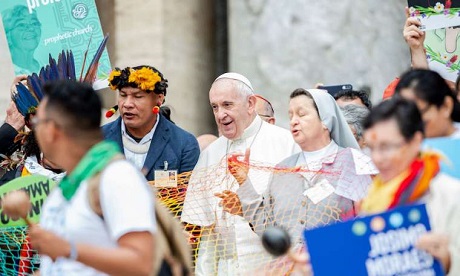Climate change, water resources, inculturation and indigenous practices were among the topics discussed during the Amazon Synod’s Sunday afternoon session.
A general summary of the topics discussed during the closed-door session has been published.
Some of the discussions focused on ordaining married men. It was described as a “legitimate need” but one which “cannot affect a substantial rethinking of the nature of the priesthood and its relationship with celibacy” in the Latin rite.
Instead, vocational programmes for young indigenous men to promote evangelization in remote areas could be considered.
This way there would not be “first-class Catholics” who have easy access to the Eucharist and “second-class Catholics” who go without the sacrament, sometimes even for two years at a time.
Another topic focused on the need to avoid the “colonialism” that characterised early missionary efforts. Rather, cultural identities in the Amazon should be preserved.
This is important, as every culture makes its contribution to the “catholicity” of the church, which is built on respect and complementarity.
Some bishops said the church is like a complex ecosystem with “wonderful spiritual biodiversity” expressed in so many different communities, cultures, forms of religious life and ministries.
Others focused on indigenous practices.
When they are not tied to superstitious beliefs, these practices are looked upon with “benevolence” so long as they may become in tune with “the true liturgical spirit,” the speakers said.
Collecting and sharing the different “inculturated celebrations” indigenous communities use with the sacraments of baptism, marriage and priestly ordination is an option one speaker proffered.
Others built on this idea. One bishop suggested there might be a way to establish on an experimental basis — and after appropriate theological, liturgical and pastoral study — an Amazonian Catholic rite for living and celebrating faith in Christ.
Protecting groundwater from chemical contaminants coming from multinational companies and the effect mining in the region is having on the environment were also topics of concern.
Other speakers focused on the serious consequences abusive practices are having on local peoples and urged respect for human and environmental rights.
Climate change, ending the use of fossil fuels, especially in industrialized nations which produce the most pollutants, are similar concerns.
The way many young people are taking the lead in promoting “integral ecology” was noted.
It is important to reach out to young people on issues dealing with safeguarding creation and to promote young people’s efforts, many bishops agreed.
Source
Additional reading
News category: World.




